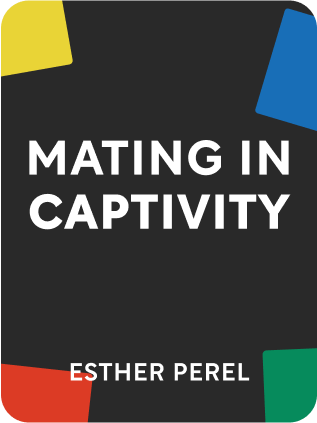

This article is an excerpt from the Shortform book guide to "Mating in Captivity" by Esther Perel. Shortform has the world's best summaries and analyses of books you should be reading.
Like this article? Sign up for a free trial here .
Are commitment and desire mutually exclusive? Do you think it’s possible to maintain sexual desire in a lifelong relationship?
Many couples therapists think that it’s normal for desire to fade and that lust is immature or based on fear of commitment. But according to psychotherapist Esther Perel, you can have both commitment and desire in the same relationship, they just may not always take place at the same time.
Here is what Esther Perel has to say about committed sex.
Are Commitment and Desire Mutually Exclusive?
Commitment is based on predictability, certainty, and security, while desire thrives on mystery, uncertainty, and risk. Commitment and desire seem to be polar opposites, and according to most people, passion fades over time in long-term relationships which is why committed sex life isn’t as fun and exciting as it is at the beginning of a relationship. Even biochemistry agrees—the romance hormones (PEA, dopamine, and norepinephrine) don’t last more than a few years, while oxytocin, the hormone released by cuddling, lasts far longer.
Most people think you have to choose between commitment and desire, and different types of people choose one or the other:
- Romantics prioritize passion. They’re always searching for a person they’ll permanently desire. When desire inevitably fades, they decide they’ve fallen out of love and end the relationship. They value intensity over stability.
- Realists prioritize love (respect, companionship, and so on) over good sex. They feel that passion’s dangerous and a bad foundation for marriage. When desire fades, you put up with it. They value security over passion.
Stamping out Fear
When you first meet someone, you feel excited, intoxicated, high—and scared. As you become more attached to them, you start to fear losing them, so you try to make your relationship more secure. For example, you turn a previously spontaneous activity into a habit. However, the scared feeling was what made you excited, and as you banish it, the excitement is banished too.
Fear of loss isn’t only fear of losing love. Historically, marriage and passion were separate. People used to find love outside of the relationship, and they used to find security, order, meaning, community, and belonging in traditional institutions like religion and extended family. In modern times, however, individualism is a core value of American society, and while it comes with freedom, it also comes with loneliness. These days, we expect our partners to not only love us and sleep with us, but also to provide everything traditional structures used to, including saving us from existential vulnerability. If the relationship were to end, we’ve lost not only love, but also a large part of our world.
As a result, many people are least experimental and adventurous with their partners because we don’t want to lose them. People might be willing to do anything outside their relationships, but at home, they’re almost puritanical. Anything “naughty” can feel risky or inappropriate for a committed relationship.
How to Balance Security and Commitment
Having established just how much some of us rely on our partners, you might be thinking desire’s doomed, because we can’t give up even a little of that critical security. However, rekindling desire can be more about perception. You acknowledge that the other person is the other person—a separate individual from you. It’s scary to do this because it makes your connection with them feel weaker. However, they have always been and always will be a separate person from you, so there’s not a lot of literal risk. Fear is a driver of desire, but so are curiosity and mystery—if you can find a way to look at your partner in a new light, in which they’re no longer a person you know, there’s space for desire.

———End of Preview———
Like what you just read? Read the rest of the world's best book summary and analysis of Esther Perel's "Mating in Captivity" at Shortform .
Here's what you'll find in our full Mating in Captivity summary :
- Why it's difficult to have a good, erotic life within a long-term relationship
- What makes up our individual sense of desire and our desire for our partners
- Tips on how to retain desire in a committed relationship






